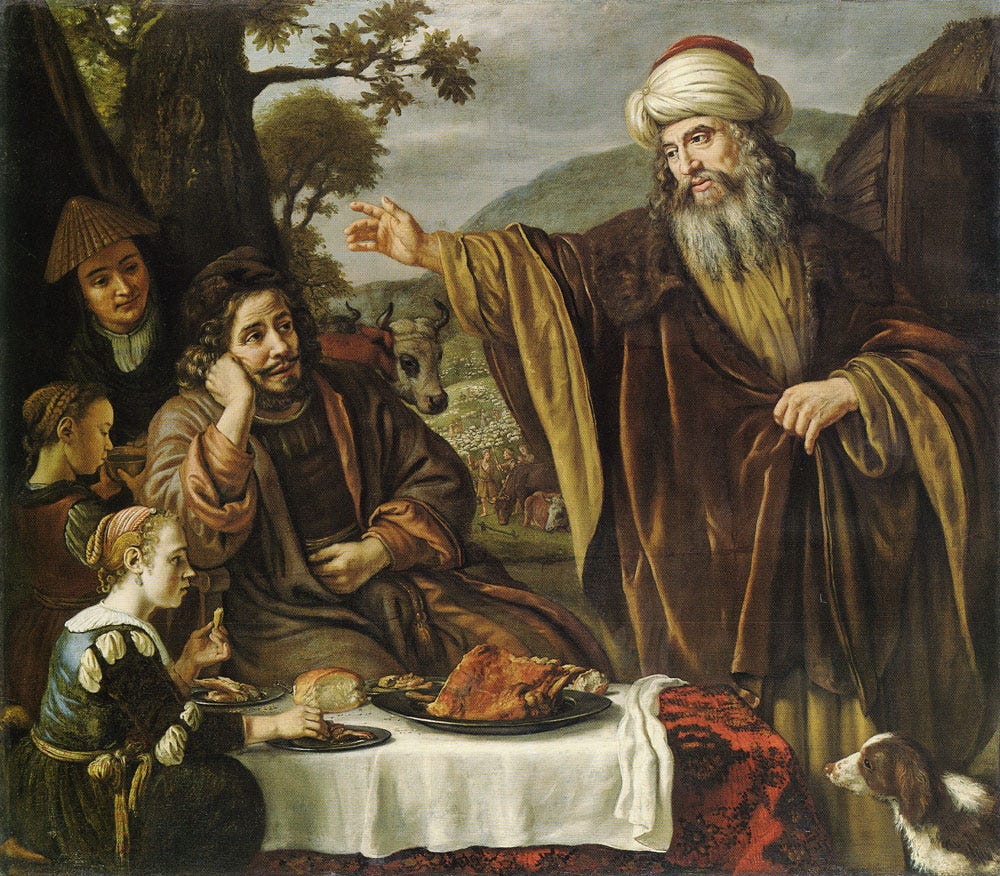Brad East is an associate professor of theology at Abilene Christian University. He is the author of many books including the recently released The Church: A Guide to the People of God (2024). He also writes regularly on his personal blog.
I am tempted to begin by saying that the first thing every university and college student needs to learn is how to read. But I’ve written about that plenty elsewhere, and you can’t throw a stone on the internet without hitting someone writing about the crisis of literacy on campus and in the public schools. Since I’m a theologian, moreover, there’s some low-hanging fruit (no pun intended) just waiting for me to reach up and take it.
Here's my real answer: If learning is about knowing, then every college student needs, through teaching, to come to know God. Another way to say this is that every student needs to learn how to pray.
There are many ways in which this is true, and many reasons why I say it. Let me begin with the ways before I explain the reasons and turn, finally, to what it might look like in practice.
One way to frame knowing God is to describe it as a quest for ultimate truth. Philosophy is an explicit form of this quest, and science is an implicit form of it. On this quest for truth with a capital “T,” the little word “God” may or may not name a concrete entity or living being; it may be a stand-in for the end of the search, or perhaps a hypothesis yet to be proven. Nevertheless the pursuit of Truth is finally the pursuit of God, on one hand, inasmuch as the question of God inevitably arises at some point in the journey toward knowledge; and, on the other, because as a matter of historical fact the search for Truth is inseparable from the knowledge of God—even when His existence is denied or unknown. In the West this is a historical given through the Enlightenment and Romantics; just think, for example, of Descartes, Pascal, Spinoza, Locke, Newton, and Leibniz, men born only fifty years apart, and each in his own way captivated, sometimes obsessively, by divinity. The rule still obtains into the twentieth century, too, even for the most secular or naturalistic thinkers. Simply put, God is unavoidable. Every serious intellectual comes to Him eventually.
No student, therefore, should earn a liberal arts degree without facing God either. But how?
One way is to learn about candidates for deity. It may be surprising how few there are. To be sure, there are countless ancient claimants to the throne, but these have been either defanged or mocked into fiction. A study of gods thus is a study of religions, because gods have living worshipers or they don’t exist. But there is a difference between studying gods and studying “world religions.” The irresistible temptation of the latter is to sample the global buffet as a kind of dilettante anthropologist: a classroom tour of exotic specimens representing outmoded superstitions. How quaint, we remark, as we set the icon back on the desk.
That’s not what I have in mind. Any legitimate candidate for deity wants your soul. A class devoted to the gods should take this seriously. Just as a good philosopher will teach students that questions about meaning and purpose are not abstract or irrelevant but urgent and existential, so a theologian will teach students about the gods as a matter of life and death. Is God? and Which is God? are questions on which everything hangs. To say this is not to prejudice the answers—perhaps they are No and None—but it is to rule out treating the subject flippantly, as akin to astrology or alchemy. It is also to assert that theology, which is the study or knowledge of God, belongs in any university worthy of the name.
As a theologian I would welcome the introduction of courses that took the question of God seriously, indeed, that took exemplary and influential writing and thinking about God seriously: courses on the attributes of God, the ethics of divine command, and so forth. No alternative topic or set of teachings would span more cultures, more times and places, more centuries, more religious traditions—or would better avoid the parochialism of the postmodern West—than such courses. Yet it must be said that no student of God, no believer in God or worshiper of Him, has any interest in remaining at the level of third-person knowledge, that is, questions and facts about God. What makes God God is his qualitative unlikeness to all other objects of study, what theologians call His transcendence.
God is incorporeal (not a body), immaterial (not made of matter), invisible, eternal, and infinite. He cannot be studied in a lab, placed in a petri dish, or spied through a telescope. What we know of Him we know by inference or by revelation: by reasoning from effects in the world, tracing them to their ultimate cause in Him, or by receiving what He has to say about Himself, if He so chooses.
For roughly half of the world’s population—I mean Jews, Christians, and Muslims—God has revealed Himself to humankind, beginning with the man Abraham, who lived around four thousand years ago. This God is the one and only God; better put, God is one. In revealing Himself, he does not offer a list of abstract propositions about the nature of deity. Rather, He communicates Himself to individuals and communities. This He does in a variety of ways, but above all through His awesome presence, His marvelous actions in the world, and His “word” or speech.

I am not in a position to speak for other world religions, but I think it is fair to say that they, like adherents of Abraham’s God, understand divinity not to be a distant or irrelevant principle, the knowledge of which would be similar to knowledge of quarks or black holes, but rather an opportunity for communion, for a relationship that draws human beings simultaneously closer to the deepest nature of reality and to their own inmost selves. As John Calvin once wrote, “Our wisdom, insofar as it ought to be deemed true and solid wisdom, consists almost entirely of two parts: the knowledge of God and of ourselves. But as these are connected together by many ties, it is not easy to determine which of the two precedes and gives birth to the other.”
In short, the knowledge of God that matters most is first-person knowledge, what the Jewish philosopher Martin Buber called “I-Thou” knowledge. It is a matter of addressing God, having been addressed by Him. The name for this address, for this act of communication and encounter, for the highest and most desirable form of theological knowledge, is prayer. Theology of every kind begins and ends in prayer.
I can imagine some readers, willing to walk with me up to a point, stopping here. Religious or not, they readily grant that all students should be exposed to historic conversations about God, whether by philosophers or theologians or scientists. This exposure should be normative, not merely dry and descriptive. Such conversations would enliven public universities as well as private secular colleges by injecting them with pressing questions about the good life—about the nature of existence, our place in the universe, and the fact that death comes for us all. These questions are part and parcel of the liberal arts, and our abandonment of them calls for recognition, regret, and retrieval.
But surely we can all agree that prayer is a bridge too far? That prayer belongs in religious schools and seminaries, but nowhere else? That its proper home, in fact, is not the classroom at all but houses of worship—the synagogue, the church, the mosque?
It may well be the case that, as a matter of law or convention or both, prayer is unwelcome in secular and public classrooms. This does not mean, however, that prayer is a private affair, relegated by definition to devotional or liturgical spaces, or that it has nothing to do with learning, including the sort of learning that happens across this country in major research universities and other institutions of higher education. Put differently, the fact that it is unwelcome does not mean that it is unfitting. It belongs, whether it is invited or not.
Prayer belongs in spaces of learning for at least three reasons.
First, God is the source and end of all knowledge. God knows all and is one with His own knowledge, of Himself and of all things, and therefore to seek knowledge is, willy-nilly, to petition God to impart the knowledge He has and is to us, finite creatures whose reason is nothing but a participation in His. Prayer not only acknowledges this truth but initiates the motion of the mind, so to speak, in the right direction.
Second, prayer is a posture of humility, and epistemic humility is the beginning of all other intellectual virtues. Prayer asks to receive; it does not declare rights of ownership. Homer opens with the Muses because he knows that his art cannot have its source in him alone. Teachers and students imitate Homer and all other wise knowers by turning to the Giver before seeking to gain or grow or give knowledge themselves.
Third, knowledge is not an end in itself, and prayer displays and embodies this—a difficult thing for those of us who hunger and thirst for knowledge, because our desire tends to make us insatiable and selfish. We gorge on knowledge and invite others to do the same. We are epistemic gluttons and pride ourselves for it. But knowledge is proximate, not ultimate. In the words of Saint Paul, “Knowledge puffs up, but love builds up.” The only knowledge worth having is knowledge ordered by and to love. Ordered by love, knowledge builds up our neighbor and serves the common good. Ordered to love, knowledge finds its term in the praise and glory of God, our shared final cause and the end of all our knowing. Knowledge thus ordered is both happy and just. Prayer, accordingly, disciplines our wayward desires and orders our misshapen loves so that our quest for knowledge might end where it should: in God our Creator, the Lover of our souls.
For this reason, theology was long thought to be the queen of the sciences; every form of knowledge found its principle of unity and coherence in God alone. The very name “university” tells of this founding aspiration: a whole universe of the many objects and modes of human inquiry made one in the One. Attentive observers will notice that, in the absence of such a unifying epistemic (and moral) principle, our society struggles to articulate the rationale and purpose of education; what makes a university one thing, not many; what holds it together besides administrators, diplomas, and students’ parents acting as customers securing their children’s economic future.
What is lacking, quite practically, is prayer. What is wanting in the curriculum is God. The one thing every college student needs to learn is missing in action. Whether the relevant faculty and institutions will see the problem, much less fix it, is an open question. Whether the need exists is not.
The Raised Hand is a project of the Consortium of Christian Study Centers and serves its mission to catalyze and empower thoughtful Christian presence and practice at colleges and universities around the world, in service of the common good. To learn more visit cscmovement.org.





@BradEast Maybe it's because I've been reading James Smith's introduction to Radical Orthodoxy but it seems like there is some overlap here with Millbank's starting place (ie. Restoration of Queen of the Sciences rather than his platonism). I'd be interested to hear how these assertions would relate to RO.